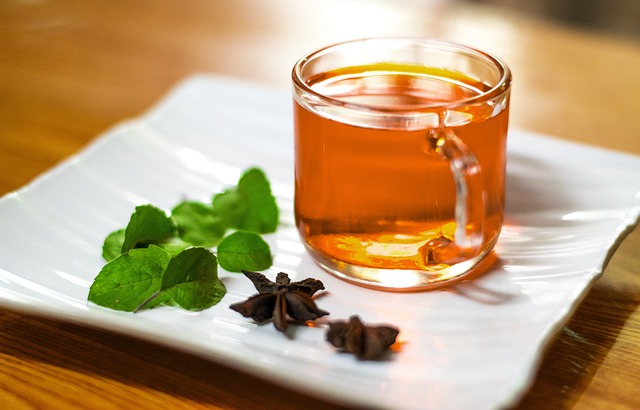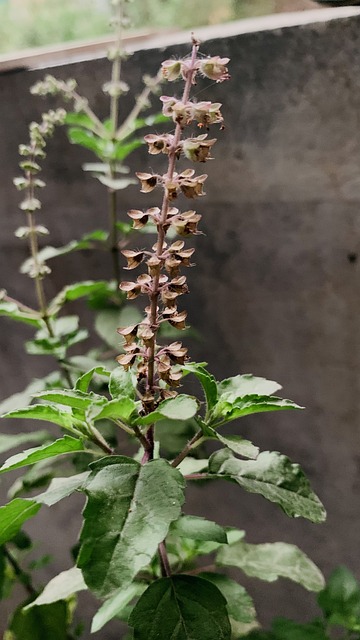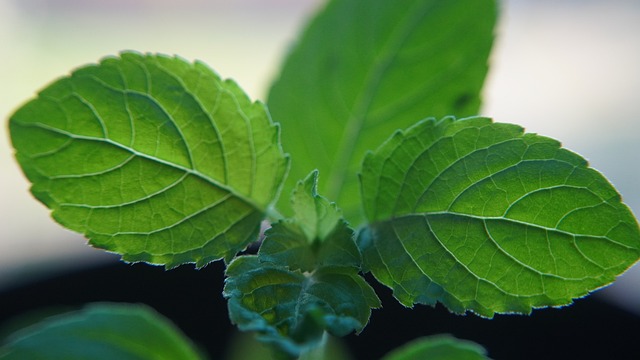Herb of the Month: Tulsi (Holy Basil)
This post may contain affiliate links. View our disclosure policy here.
I’m beginning what I hope to be a long series of Herb of the Month posts. Ever since taking courses through an herbal school out of Boston starting back in 2019, I have become positively enamored with herbs! Herbs line up quite a number of shelves in my kitchen and are combined together in a mason jar to make tea almost every morning! For this month’s Herb of the Month post, we will focus on Tulsi(Holy Basil).

What is the difference between Tulsi(Holy Basil) and Sweet Basil?
Both basil and tulsi are members of the herb family, Lamiaceae, commonly known as the mint family. However, they are different species, and do have different features.
Sweet basil (Ocimum basilicum), a name given to the common kitchen herb, is used in a variety of culinary dishes. In my kitchen, basil is used in almost everything with tomatoes! It has a strong, sweet flavor and is often used in salads, pesto and soups. It definitely has a role in Mediterranean cuisine! The plant’s flowers are white and the leaves are smooth. You can read more about basil in last month’s post on basil and rosemary.
Tulsi(Ocimum tenuiflorum or Ocimum sanctum), on the other hand, is a herb that has traditionally been used in Ayurvedic medicine and a large number of herbalists world wide. It is fast-growing in popularity with it’s amazing health benefits. Tulsi is said to have a slightly more pungent aroma and flavor and is typically not used in cooking. I have been known to throw it in a few soup or sauce recipes, however, without noting a difference between it and sweet basil. The plant’s flowers are a light purple and the leaves have a toothy edge. Tulsi is known to have warming, drying and relaxing energetics. We will discuss the plant properties or actions below.
Discover the Health Benefits of Tulsi(Holy Basil)!
Tulsi is a Calming Adaptogen
As I’ve mentioned, tulsi (Holy Basil) has been used throughout history for its health benefits. Tulsi has become one of my absolute favorite herbs and I work with it nearly every day in whatever tea combinations I create first thing in the morning. Working with it this way, I am mostly aiming for it’s benefits as an adaptogen. An adaptogen is a natural substance found in plants that helps the body cope with stress and maintain a state of balance. Therefore, Tulsi can help the body cope with stress, grief and anxiety. It is commonly used in traditional medicine to help improve overall well-being.
Tulsi as a Nervine
Tulsi is also a nervine. A nervine calms nervous tension and actually nourishes the nerves. Other nervines I love include chamomile, catnip, lavender and lemon balm. I’m sure they will all make it to Herb of the Month sooner or later! As a nervine, Tulsi can somewhat stimulating at first- uplifting is probably a better term, but there follows a strong sense of calm and feeling grounded. That’s a part I love. Feeling calm and grounded!
Tulsi For the Immune System
Tulsi is another herb, like chamomile and rosemary, that is rich in antioxidants and is thought to help fight off infection and disease. Tulsi’s known antioxidants include eugenol, ursolic acid, and rosmarinic acid. These antioxidants help to protect the body from the damage caused by free radicals, which can lead to chronic diseases such as cancer and heart disease. It’s also a great thing to have around when you are fighting a cold or other infection.
Nutrition With Tulsi
Tulsi is actually quite high in vitamin K, important for blood clotting and bone health. For eye health, tulsi is high in vitamin A. Other nutrients include vitamin C, calcium, Iron, Manganese, and Zinc.
And So Much More!
Tulsi is traditionally worked with to treat respiratory issues such as asthma and bronchitis. Tulsi is known to help with digestion and may be used to treat stomach ulcers. Also known as an anti-inflammatory, tulsi is known to help reduce inflammation in the body. Because the herb is an antispasmodic, headaches are also often helped with the use of tulsi.
Growing Tulsi
I don’t know a lot about growing tulsi yet but hope to incorporate it into my herb garden this spring! I do know that it ‘s supposed to be a relatively easy plant to grow. It grows as a shrub in warmer zones but can still be planted annually in cooler zones. They are very sensitive to frost. I may decide to buy seeds but I may just find a place to order the live plants. I’ll keep you all posted!
I just barely started looking into it, but I found this video last night from Herbal Revolution. In the video, Kathryn talks about the variety they grow and how to harvest this amazing plant!
How Do I Work With Tulsi?
Tulsi Tea

There’s no one perfect way to work with herbal medicine. But my personal favorite is through tea. Tea is a fast delivery mechanism and in their whole form, herbs retain their bioavailability. This means the compounds are in a form that is easily digested and metabolized by the body. Also, many herbs contain a number of compounds that work together in a synergistic manner. Of course, purchasing the dry herbs tends to be more cost effective than in supplement form.
I generally make a warm infusion with tulsi. This is what most people think of as a general cup of tea, simply placing the herbs in a hot cup of water and allowing to steep. Many people only allow tea to steep for a few minutes, and if you are drinking black tea just for taste, that’s fine. But to get the medicinal effects of tulsi or other herbs, you want to steep longer, about 10 minutes or more.
Personally I place my herbs in a stainless steel tea infuser inside a 32 oz. mason jar and let it steep while I walk on the treadmill in the morning. I leave the herbs in their as I drink as well because some herbs have constituents that come out as the tea cools rather than when it’s warm. I’ll have to write a post all about making tea sometime! There are some sources online on making a cold infusion with tulsi! I have not made this recipe yet but I’m looking forward to doing so this summer.
Other Forms of Tulsi(Holy Basil)

As I stated above, there’s not necessarily any one particular perfect way to work with herbs for their medicinal benefits. In addition to tea there are tinctures, powders in capsule form, dried and added to food dishes, essential oils for aromatherapy, and various other ways. I have worked with tulsi in tea, tinctures and in supplement (capsule) form. Tulsi has been an ingredient in supplements I have taken through my functional medicine doctor’s recommendation and I have taken this one previously on my own. I also like this tincture.
Products I LOVE
Foster Farm Botanicals – I LOVE the tulsi grown at Foster Farm Botanicals. It’s also my favorite source for Calendula!
Mountain Rose Herbs – This is a great source for a lot of bulk herbs and products. Their shipping can take awhile, but the products are worth it!
Products From Amazon (as an affiliate, this helps me buy my own tea but at no extra cost to you)
Organic India Tea Variety Pack – this pack would allow you try several blends of Tulsi.
Tulsi Honey Chamomile – if you want to try both Tulsi AND lovely chamomile!
Stainless Steel Tea Infusers – these are the infusers I love to use with mugs or a mason jar to make tea with dried herbs that are not already in tea bags.
17.7 Oz BPA Free Tea Steeper – if you prefer, you can steep right in the container and then simply empty the tea right over your mug.
Please remember: I am not a doctor or licensed healthcare provider. This post, as are all others on My Wellness Basket, are for educational purposes only. Please see my disclaimer page.







Carol, how do you store your herbs? Or do you grow them in pots in your kitchen?
The majority of my herbs are stored in glass jars with lids. Unfortunately, most are on an open shelf. It is best to store them either in dark jars (which are more expensive so I only have a few) or in a closed cabinet to prevent light from hitting them frequently. I do group them together and away from the window though.
I have not been very successful with indoor herbs yet. But I will keep trying! I’m trying to plan the outdoor herbs right now though!
I loved this article! I am new to the world of herbs and I’ve found that when I steep some of them too long, the tea becomes bitter which I am not a fan of. I’ll definitely have to give this herb a try.
Yes, especially those herbs classified as bitters can indeed become more bitter over time. I would try each herb individually if I were you. Play around with the length of time. With many herbs you may get more benefits with a longer steep, but if it becomes bitter so that you don’t drink it that defeats your purpose. So if a shorter time is necessary for your taste buds, then shorter gives you some benefits which is better than none! Herbs are really interesting. There are some herbs where you get benefits with short steeps, but completely different benefits with longer steeps. They are fascinating!
Wow, I had never even heard of Tulsi before reading this but now I definitely want to start adding it to my tea! Thanks for sharing!
It’s truly a favorite of mine. My new favorite is Lemon Balm. Be sure to come back next month for information on that one!
Due to the prescription meds that I am on for anxiety Im afraid to try herbs. Before I was all about the natural and preferred holistic over anything else. I enjoyed reading this article and I find it fascinating to read what herbs can do.
What do you put in your tea to drink it? Honey, sugar, milk? Im curious if you just drink it straight.
It would be best to discuss this with a professional herbalist. A lot of medical doctors tell patients to stay away from herbs because they really don’t know if they will interact or not. It really depends on the person and the herb. Herbs like chamomile are completely safe. I have never read anything about interactions with Tulsi. I’m not a professional herbalist though. I only consider myself a student herbalist at this point but I have taken a lot of classes and read fairly extensively on the topic. I don’t really put anything in my tea except the occasional herb infused honey or stevia leaf if it’s a bitter herb or nettle (stevia leaf as in the actual dried herb). I had to go on a sweetener free diet one year and while I still consider myself a sugar addict, I don’t find sweetening most teas necessary.
Wow, I love drinking tea but I have actually never heard of Tulsi before! My go-tos are green tea, chamomile tea, and other more common ones. Thanks for sharing, I need to try this!
I can’t talk Tulsi up enough! It’s great, especially mixed with others. Today I mixed tulsi with lemon balm and hibiscus. 🙂
I loved this article! and I find it fascinating to read what herbs can do.. There are some herbs where you get benefits with short steeps, but completely different benefits with longer steeps. They are fascinating! Thanks For Sharing.
I agree! Herbs will definitely be a big part of this blog! I hope to see you come by again! Thank you.
I really enjoy drinking tea, but to be honest, I haven’t come across Tulsi before. I know about it’s benefits. Tulsi tea is rich in antioxidants, which help protect the body against damage from free radicals. It may also stimulate the production of immune cells, which can help fight off infections. I certainly try it.
This was an excellent article! I’m new to the world of herbs, and I’ve discovered that if I steep some of them for too long, the tea gets bitter, which I don’t like. I’ll definitely have to try this herb.
https://www.intellectfolks.com/wordtune-editor-writing-assistant/
Yes, most herbs do get more bitter the longer they steep. This is good for the digestive system but not always for personal taste! I’ve never found tulsi to be bitter up to the amount of time I suggest. I often have it in blends that I steep longer. If bitterness makes you shy away from herbs, I’d keep your steeping times to no more than ten minutes. Play around with it. Sometimes a shorter steeping time might mean less medicinial properties but no steeping or no tea means none. Some is always better than none! You may be able to increase your steep time as you acquire more taste for the herb. You may also find that if you blend a sweeter herb with one you find a bit bitter it makes it more tolerable.
I loved this article